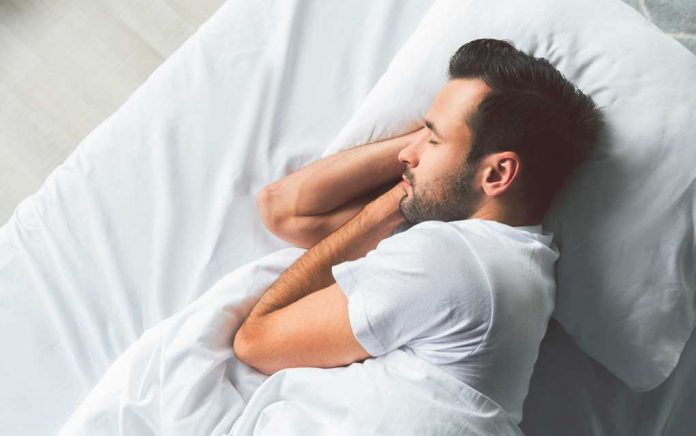
If you are getting less than seven hours of sleep on a regular basis, chances are you are experiencing signs of sleep deprivation. You have a busy life, your job is demanding, your family depends on you, and you don’t have time to get the 8 to 9 hours you need. So what’s the big deal over a little lost sleep?
It is a big deal. In fact, sleep deprivation could make you look old before your time, have a negative impact on your concentration and attention span, jeopardize your job or promotion, take a big toll on your immune system, make you irritable with your partner and coworkers, and even result in injury or death if you nod off while driving. Perhaps it’s time to rethink your need for sleep!
Lack of sufficient sleep can actually pose a number of significant health and lifestyle hazards you may not have considered. So what are the signs you are not getting enough sleep and what can you do about them?
1. You’re hungry all the time. Your brain needs energy all the time to function properly, and much of that energy is generated while you sleep. However, if you don’t get enough sleep, your brain searches for energy elsewhere, and what better place than food? Actually, people who are sleep deprived often experience hormone problems; namely, they produce more of the hunger hormone called ghrelin and less of the hormone that makes you feel full (leptin). The result is that you crave certain foods (and you can bet they don’t include broccoli and carrots!) and your brain does not receive enough messages to stop eating. This combination can lead to another sign you are sleep deprived: weight gain.
2. You’re packing on the pounds. Weight gain associated with sleep deprivation can be associated with the increase in hunger (and food intake) as we’ve already noted, plus a decline in metabolism rate that accompanies lack of sleep. Yet another contributor to weight gain among sleep deprived individuals is a careless approach to food choices. When you’re tired, you’re less likely to take the time to make wise menu selections. In addition, sleep deprivation for four days in a row can reduce the ability of your fat cells to respond to insulin by 30 percent
Read about lack of sleep and weight gain
3. You’re having trouble thinking clearly. Insufficient sleep has a negative impact on your ability to make decisions, solve problems, and respond quickly to situations. In a study of about 50 young adults, those who were sleep deprived showed a drop of 2.4 percent in accuracy testing while those who had adequate sleep improved accuracy by 4.3 percent.
4. You’re moody, grouchy, and irritable. If you’re much less fun to be around and you’re putting people off with your attitude, then you’re likely sleep deprived. This is true for people of all ages, including adolescents. An August 2015 study in Sleep Medicine reports that healthy adolescents who missed just one night of sleep showed significantly worsened depression, anger, anxiety, confusion, and fatigue when compared with nights of adequate sleep. Females were especially susceptible to these mood changes.
5. You approach risk differently. A recent study found that men and women respond to risk and risk decisions differently when they are sleep deprived. One reason for this shift is that the prefrontal cortex is especially vulnerable to sleep loss, and risk-taking is located in that area of the brain. In the study, researchers found that sleep loss caused males to make riskier decisions than when they were well rested, while females did the opposite.
6. You're more impulsive. When you’re tired, you’re more likely to act without thinking…because your ability to think has been compromised. So you’re more likely to reach for that doughnut, make a callous remark, get into an argument with your spouse, cut someone off on the highway, or buy that overpriced sweater.
7. Your memory is fuzzy. It makes perfect sense: sleep deprivation makes it more difficult for you to think clearly and your attention is less sharp. So if you experience memory problems associated with sleep lost, you haven’t completely lost your mind! In a study of 50 young adults, participants were given memory and reasoning tasks before and after 24 hours of sleep deprivation. The authors found that sleep deprivation “strongly compromises time-based prospective memory compliance” as well as “the ability to perform an intended action after a few minutes.”
Read about better sleep for your health
8. Your emotions are out of control. A University of California (UC), Berkeley, study reported that sleep deprivation can make it more difficult to keep your emotions under control. Thus you may find yourself crying, laughing, getting angry, or anxiety-ridden at the drop of a hat. It appears this is true because lack of sleep is associated with a disconnect in an area of the brain that regulates emotions. According to one of the study’s authors, Matthew Walker, director of the UC Berkeley’s Sleep and Neuroimaging Laboratory, “It’s almost as though, without sleep, the brain had reverted back to more primitive patterns of activity, in that it was unable to put emotional experiences into context and produce controlled, appropriate responses.”
9. You get sick more often. One of the more common side effects of sleep deprivation is a compromised immune system and, as a result, less ability to ward off infections. For example, a study of 153 adults looked at sleep habits for 14 straight days and the likelihood of developing the common cold. The researchers found that participants who got less than seven hours of sleep were nearly three times more likely to develop a cold than those who got eight hours or more of sleep. Sleep is essential for a properly functioning immune system because that’s the time it makes substances called cytokines, which are proteins that fight inflammation and disease-causing organisms. A recent study has shed more light on this situation. While formerly it was believed cytokines were produced only by the immune system and were active there alone, now it’s clear cytokines are also present and active in the brain, where they interact with other factors that control sleep.
10. You nod off. Nod-off sessions, also known as micro-sleep, are your brain’s way of saying you are sleep deprived. It’s not unusual to nod off during a boring meeting or when you’re a passenger in a car or plane. But it’s quite another to do it frequently or when you’re behind the wheel of a car or operating dangerous equipment, when you place your life and others in danger. According to a study by the Centers for Disease Control and Prevention, 4.2 percent of adults said they had nodded off while driving within the last 30 days. Don’t let that be you!
Read about fighting back against sleep deprivation
What To Do about Sleep Deprivation
- Establish a schedule. Go to bed and get up at the same time every day. Although there will be occasions when this schedule will not be possible, stick to it as much as possible.
- Relax before bedtime. If you thoughts won’t shut off or you find it difficult to relax before going to bed, practice a routine that promotes relaxation, such as yoga, meditation, deep breathing, listening to soothing music, reading poetry, or taking a hot shower.
- Take naps. According to the National Sleep Foundation, taking a short nap (20-30 minutes) improves alertness. It also is the best length of time to help you feel refreshed when you get up and not interfere with your nighttime sleep. A nap is critical if you are drowsy when driving!
- Turn off the electronics. The blue light glow from laptops, cell phones, TVs, and tablets trick your brain into thinking its daytime and disrupts the production of the sleep hormone, melatonin. Wean yourself off of the gadgets and don’t even have them near you at night.
- Limit or avoid alcohol. Although you may think having several drinks will help you sleep better, they actually can disturb sleep quality. Alcohol can cause you to wake up multiple times throughout the night and prevents you from getting REM and deep sleep that you need.
- Examine your drug use. Certain prescription and nonprescription drugs can cause sleep disturbances and cause you to be sleep deprived. Some of them include beta blockers, oral contraceptives, steroids, inhaled respiratory drugs, seizure medications, some antidepressants, pseudoephedrine, amphetamines, and caffeine.
- Create a sleep-worthy environment. It’s difficult to get a good night’s sleep if you’re not comfortable. That includes everything from a suitable mattress, pillow, and coverings, as well as temperature (keep your room cool), light (keep it dark), and smell. David Cloud, CEO of the National Sleep Foundation, noted that “Having a pleasant scent and a relaxing bedroom routine can contribute to a good night’s sleep.”
- Eat light. A piece of fruit or a few whole grain crackers before bedtime can ward off hunger pangs. However, large meals will cause your digestive system to be working into the night and disrupt your ability to sleep.
- Avoid sleeping pills. These pharmaceutical wonders may have a negative impact on sleep’s ability to consolidate memories. When you are in a deep, slow-wave sleep and REM sleep, your brain is actively consolidating and converting short-term to long-term memory. Sleeping pills can disrupt these critical functions. In addition, sleeping pills are associated with a long list of side effects, including daytime drowsiness, constipation, diarrhea, dizziness, unusual dreams, problems with balance, headaches, and more.
- Check with your doctor. It’s possible your sleep deprivation is associated with a medical condition such as asthma, restless legs syndrome, gastroesophageal reflux disease (GERD), chronic pain, or sleep apnea. If so, you can work with your physician to correct the problem and your sleep issues as well!
You can win the battle against sleep deprivation by making some modifications to your lifestyle. Once you do, the rewards will be remarkable in terms of physical, emotional, mental, and spiritual health and wellness.
Try Morphus Sleepus, a non-habit-forming sleep supplement. This supplement addresses sleep issues during perimenopause and menopause by reducing cortisol levels, relaxing the body and mind, and promoting optimal sleep.










